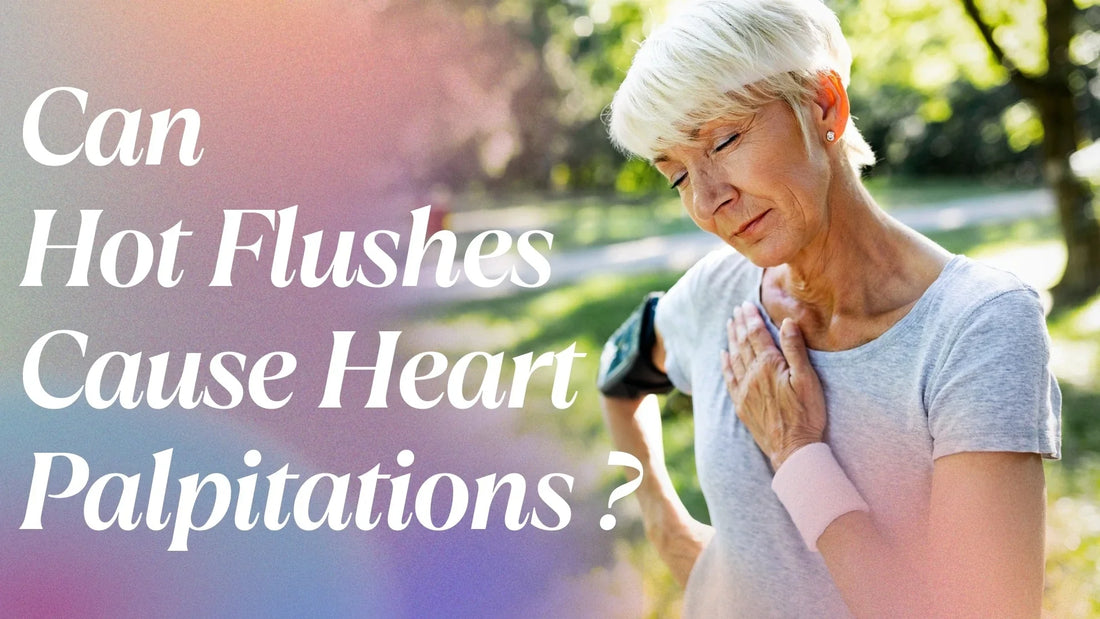
Can Hot Flushes Cause Heart Palpitations ?
Share
Hot flushes are a common symptom experienced during menopause. They manifest as sudden feelings of heat, frequently accompanied by sweating, skin flushing, and sometimes a racing or irregular heartbeat. While these flushes primarily stem from hormonal changes, they can occasionally impact your heart or mimic symptoms associated with cardiovascular health. In this article, we’ll delve into this connection and offer insights on effectively managing these symptoms.
Hot Flushes:
Hot flushes are sudden feelings of warmth that often come with sweating, flushing, and a racing heart. These episodes are mainly triggered by fluctuating estrogen levels during menopause, which disrupt the body's ability to regulate temperature. Around 75% of women go through hot flushes, and their frequency and intensity can vary widely.
Heart Palpitations:
Heart palpitations refer to the sensation of a racing or fluttering heart. About 50% of women report experiencing palpitations during menopause, especially during hot flushes. This happens because hot flushes can disrupt the autonomic control of heart rate, resulting in increased heartbeats. Palpitations can also occur on their own, independent of hot flushes, due to hormonal changes that impact the heart's electrical activity.
How Are Hot Flushes and Heart Palpitations Correlated?
The fluctuations in estrogen levels can lead to heart palpitations, which may feel as if your heart is on a chase, racing as if you’ve been in a marathon. Your heart may begin to race, sometimes even skipping a beat. These feelings can start in your chest and travel up to your neck and throat. Have you ever felt these sensations? If yes, you don’t have to worry.
Menopause ushers in a multitude of transformations, encompassing both physical and emotional shifts. Physically, you may contend with hot flushes, sweating, and night sweats, alongside discomfort from vaginal dryness and irregular periods. Apart from these, mood swings, sleep disturbances, dry skin, and hair loss may also feature prominently, accompanied by memory challenges. On an emotional level, diminished sexual desire might become a notable aspect of this transitional phase.
What Are the Causes of Heart Palpitations?
During menopause, estrogen levels change, eventually stopping production, which can cause a feeling of a racing heart commonly known as palpitations. These palpitations can also happen during hormonal changes like periods or pregnancy. In menopause, palpitations often occur alongside hot flushes, making the heart beat 8-16 times per minute faster. Other factors that can cause palpitations include:
- Being overly stressed
- Doing intense exercise
- Drinking excessive caffeine, alcohol, or smoking
- Taking certain medicines, like cough and cold remedies or inhalers for asthma
- Having a fever
- Having an irregular heartbeat
- Having a thyroid problem
- Being dehydrated
- Having changes in blood sugar or blood pressure
If you’re occasionally experiencing heart palpitations lasting just a few seconds, there’s likely no need for immediate action. However, it’s essential to monitor any changes in frequency or duration, as well as any worsening symptoms over time, which could indicate a more serious heart condition requiring medical attention. Seek emergency help if palpitations are accompanied by symptoms such as shortness of breath, chest pain, dizziness, or fainting. Taking heed of these signs ensures proactive management of your heart health and overall well-being.
Are Hot Flushes Related to Heart Issues?
The relationship between Hot Flushes and heart issues is intricate. During menopause, the drop in estrogen levels affects blood vessels, leading to vasomotor symptoms like hot flushes. These symptoms can sometimes be confused with heart-related problems since both can involve a racing heart, sweating, and feelings of discomfort. While Hot Flushes themselves do not directly cause heart disease, they can indicate the need to evaluate overall cardiovascular health, particularly if other symptoms are present.
Do Hot Flushes Cause a Racing Heart?
Yes, it is possible. When a hot flush occurs, the body's temperature regulation system becomes highly active, resulting in vasodilation (the widening of blood vessels). This prompts the heart to pump faster to manage blood flow, creating the sensation of a racing heart.
This rapid heart rate, known as tachycardia, is usually temporary and diminishes once the hot flush subsides. However, if episodes of a racing heart persist or occur independently of hot flushes, it’s important to seek advice from a healthcare provider.
Can Hot Flushes Cause Irregular Heartbeats?
During menopause, hormonal changes can lead to palpitations or sensations of an irregular heartbeat (arrhythmia). Estrogen plays a protective role for the heart and blood vessels, and its decrease during menopause can result in alterations in heart rhythm. While irregular heartbeats during Hot Flushes are generally harmless, frequent or severe instances should be evaluated further to exclude any underlying heart issues.
Can Hot Flushes Affect Your Heart?
Indirectly, yes. While Hot Flushes themselves do not harm the heart, the hormonal shifts that occur during menopause may elevate the risk of heart disease over time. Lower levels of estrogen can lead to:
- Increased LDL (bad cholesterol).
- Decreased HDL (good cholesterol).
- Higher blood pressure.
Additionally, women who experience frequent or severe Hot Flushes may face a higher risk of cardiovascular problems later in life, making it essential to keep an eye on heart health during and after menopause.
Hot Flushes and Heart Palpitations at Night
Nighttime Hot Flushes, often referred to as night sweats, can be especially troubling when accompanied by heart palpitations. These episodes can interfere with sleep and heighten anxiety, worsening the symptoms. Techniques for stress reduction, better sleep habits, and lifestyle adjustments can assist in managing these nighttime issues.
Hot Flushes and Heart Disease
Research indicates that frequent and severe Hot Flushes may be associated with a higher risk of cardiovascular diseases, including heart attacks or strokes. Although the precise mechanism remains unclear, vascular dysfunction is thought to be a contributing factor. Women experiencing intense Hot Flushes should consider scheduling regular heart health check-ups.
Hot Flushes don’t directly lead to heartburn, but they can play a role in it indirectly. Anxiety, which often triggers both Hot Flushes and heartburn, can create a cycle where one condition worsens the other. Additionally, hormonal changes may slow down digestion, making acid reflux more likely during menopause.
Hot Flushes and Heart Failure
While uncommon, ongoing Hot Flushes accompanied by heart palpitations and fatigue could signal underlying issues like heart failure. If you also experience shortness of breath, swelling, or chest pain along with Hot Flushes, it’s important to seek medical help right away.
Hot Flushes and Heart Palpitations After Menopause
Some women may continue to have Hot Flushes and heart palpitations even after menopause. This can be due to lingering hormonal imbalances, stress, or other health concerns. Postmenopausal women are at an increased risk for cardiovascular diseases, so it’s essential to address these symptoms and manage risk factors effectively.
Managing Hot Flushes and Heart Symptoms
- Lifestyle Adjustments: Keep a balanced diet, exercise regularly, and steer clear of triggers like caffeine, alcohol, and spicy foods.
- Stress Management: Engage in mindfulness, yoga, or meditation to help lower stress levels.
- Hydration: Stay hydrated by drinking plenty of water to help cool down and lessen the severity of Hot Flushes.
- Medications and Therapies: Hormone replacement therapy (HRT) or other prescribed treatments can help ease severe symptoms.
- Regular Check-ups: Keep track of blood pressure, cholesterol levels, and overall heart health through regular medical appointments.





